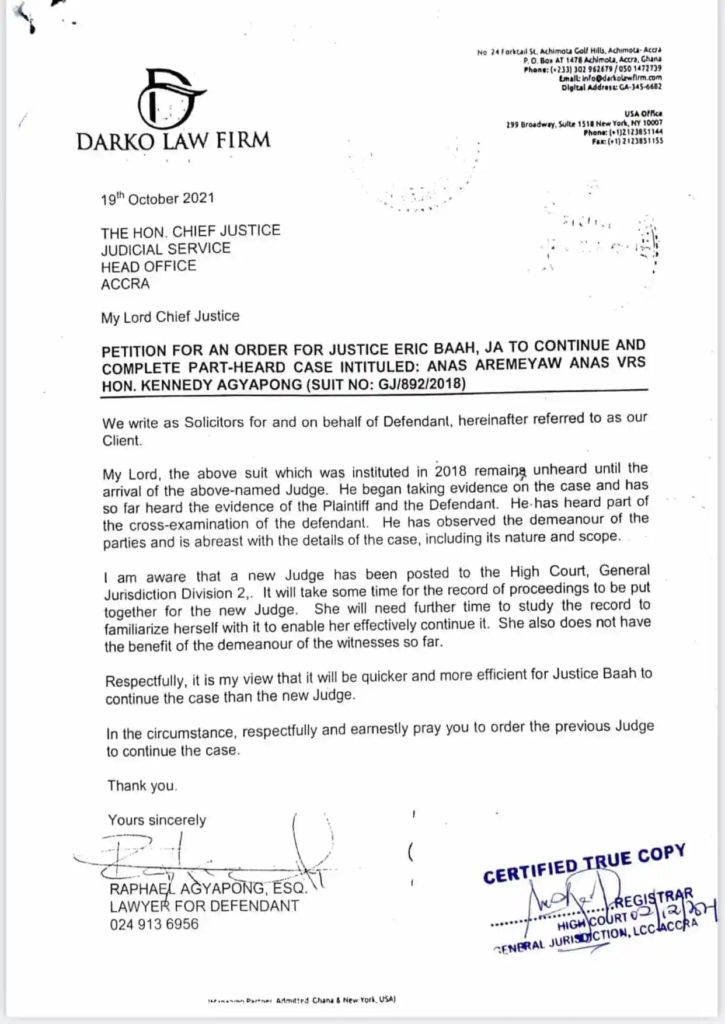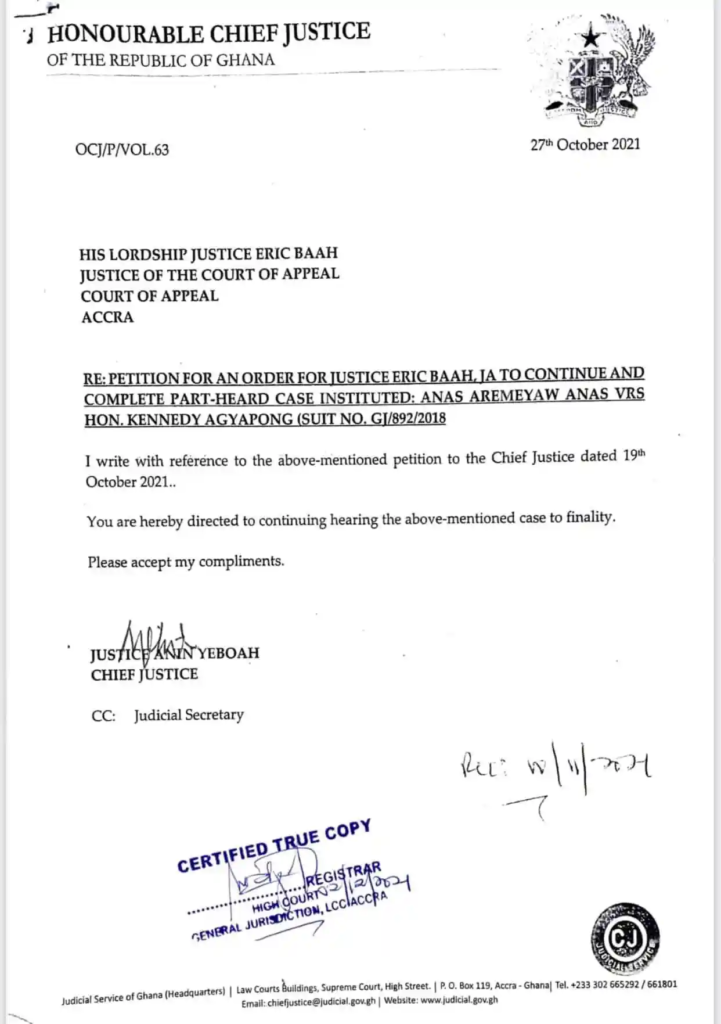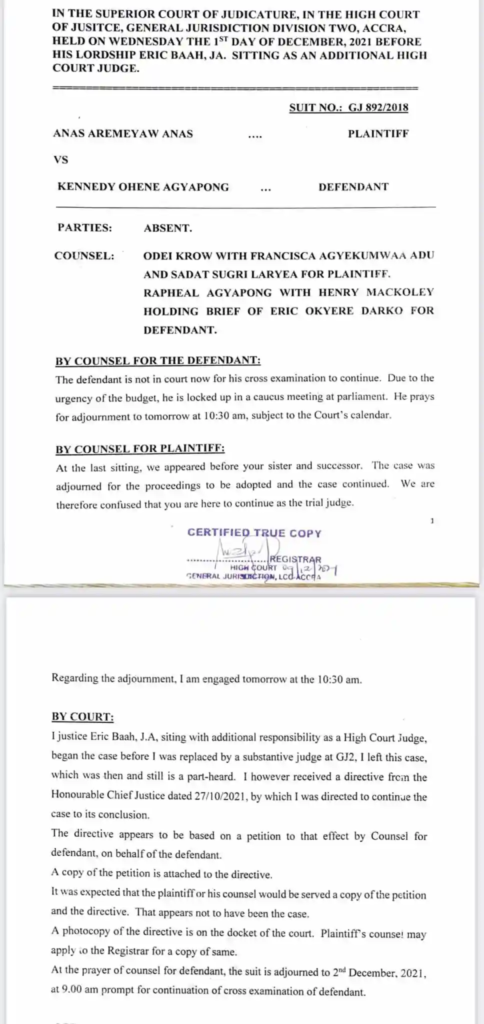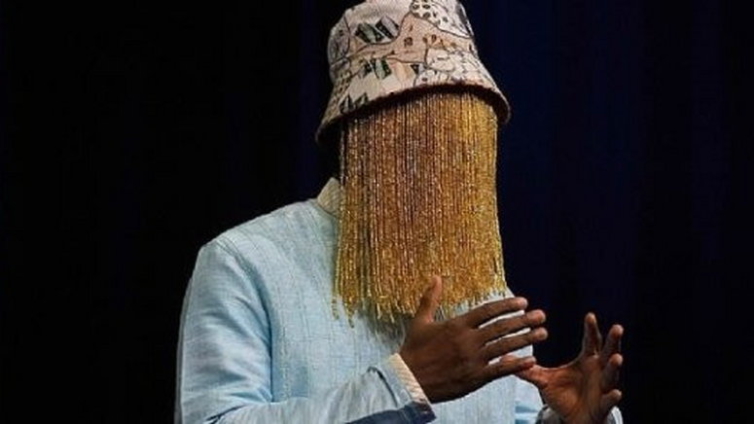It hurts when judges are lumped together and tarred with the same brush of indignity and scorn. I’m not a judge, but it hurts because I have been in courtrooms and observed judges who deliver justice with such diligence, thoroughness, and professionalism that I could feel their pain when the action of a few judges drags all judges in the mud.
One such instance is the toxic social media commentary about the judiciary in the wake of the judgment in the defamation case Anas Aremeyaw Anas brought against the MP for Assin Central, Kennedy Agyapong.
When someone first shared excerpts of the judgment on a WhatsApp platform, my immediate comment was to caution those commenting not to attack Anas until they had read the judgment. I insisted that what was posted was more like someone’s personal commentary and slant than what was contained in the judgment. In my wildest imagination, I did not think a judge who was called to adjudicate a defamation case would descend into an arena of criminal pronouncements and write a judgment that reads as though the judge was now making fresh defamatory comments against the plaintiff.
Having followed the case a bit, however, the outcome did not come as a surprise. Unfortunately, Chief Justice Anin Yeboah played a disturbing role in a process that served as a premonition of what was to come.
On December 15, 2021, I wrote a post on Facebook with the title “Twists and Turns in Anas-Kennedy Agyapong’s Case”. With documentary evidence, I wrote:
“The following are the facts I gathered from my sources as an explanation to the following documents.
- Anas Aremeyaw Anas sued Kennedy Agyapong for defamation in 2018.
- Justice Daniel Mensah (the Dormaahene) was the judge handling the case.
- In the latter part of 2020, Justice Daniel Mensah was transferred to Tema. A Court of Appeal Judge, Justice Eric Baah, was appointed interim judge to handle the case pending the appointment of a substantive judge.
- In June 2021, a substantive judge was appointed to continue the case. I’m told she is Justice Gifty Agyei-Addo, the judge who overturned the General Legal Council’s suspension of Francis Xavier Sosu from practising as a lawyer.
- On December 1, 2021, Anas and his team discovered in court that the substantive judge had been taken off the case and the interim judge had returned. They had no idea what had happened. They were given an explanation.
- On the blind side of Anas and his legal team, Kennedy Agyapong had written to the Chief Justice to request that the interim judge should return to continue the case.

- The reason Kennedy Agyapong and his lawyers gave was that the interim judge had “observed the demeanour of the parties and is abreast with details of the case, including its nature and scope.” The substantive judge, Kennedy Agyapong said, would take time to familiarise herself with the case. “She also does not have the benefit of the demeanour of the witnesses so far.”
- A week after receiving Kennedy Agyapong’s letter, Chief Justice Anin Yeboah directed Justice Eric Baah, to go back and continue the case as Kennedy Agyapong requested in his letter to the Chief Justice.

- When Anas and his legal team expressed their confusion upon seeing the interim judge in court, Justice Eric Baah said he’d been directed by the Chief Justice to continue the case. He added that Anas and his team were expected to have been served with Kennedy Agyapong’s petition and the Chief Justice’s directive. But that was not done.
“I’m not a lawyer but I’m wondering whether it is normal for one party in a case to write to the Chief Justice to suggest a judge without the knowledge of the other party, and have that wish granted.
“And per the reasons given by the defendant, if, for any reason, Justice Eric Baah is unable to continue working as a judge, won’t the case continue with another judge who may not “know the demeanour” of the witnesses?”

Having risen to the Supreme Court and elevated as the head of Ghana’s judiciary, Chief Justice Anin Yeboah must be familiar with the popular legal axiom propounded by Lord Hewart, a former Lord Chief Justice of England. He said, “It is not merely of some importance but is of fundamental importance that justice should not only be done, but should manifestly and undoubtedly be seen to be done.”
Lord Hewart, in the case of Rex v. Sussex Justices, added, “Nothing is to be done which creates even a suspicion that there has been an improper interference with the course of justice.”
The learned Chief Justice Anin Yeboah should have known that if Accra Hearts of Oak and Kumasi Asante Kotoko have a match and Kotoko unilaterally writes to the Ghana Football Association to appoint a named referee to officiate the match, Hearts of Oak and “the reasonable man” will not appreciate the fairness of the referee.
Besides, the reason given by Kennedy Agyapong and his team, being the “demeanour of the witness”, has been discredited by many sociologists. People with different cultural backgrounds and upbringings behave differently when facing authorities or law enforcers. There are some truthful witnesses who are swayed by the weight of appearing before a judge and may quaver with fear while testifying. There are also confident liars, who lie with bold and straight faces. To grant this problematic request for the stated reason was unfortunate.
The Chief Justice should have considered the fact that Anas had investigated the judiciary, which resulted in the dismissal of judges. Some of the victims of Anas’ work still serve on the bench. Some may see Anas seeking justice in the same court as the case of the proverbial cockroach appearing before hungry fowls to seek justice. This should have cautioned the Chief Justice to handle in a manner that would not feed into this perception.
On the substance of Kennedy Agyapong’s petition, one of Justice Anin Yeboah’s predecessors, Chief Justice Georgina Wood, in the case of Agyemang (substituted by Banahene) v Anane [2013 – 2014] 1 SCGLR 241, said the following of witnesses’ demeanour.
“And yet, speaking for this bench as presently constituted, our judicial experience, cumulatively spanning a period of over a century has taught us that hardly does the demeanour qua demeanour of witnesses play a significant role when evaluating the credibility of witnesses. Courts tend to rely on some more reliable criteria such as documentary evidence, the testimony of disinterested witnesses, the implausibility or otherwise of narrations given in court, to arrive at their findings and conclusions.”
So why did Anas and his team not make a fuss about this?
My sources close to them say they gave the judiciary a benefit of the doubt. They thought that their case was too strong to be decided differently. They trusted that the judge, irrespective of whatever swayed his allegiances, could not go beyond the allowable threshold of waywardness in a judicial system like ours. They, perhaps, had more faith in the judiciary than the judiciary had in itself.
There are a number of issues wrong with the reasoning of the “learned” judge in this case, but one of them should beat the imagination of any right-thinking human being. Here is what the judge said of Kennedy Agyapong’s allegation that Anas was a murderer.
“On the allegation that plaintiff murdered former member of parliament Joseph Boakye Danquah, is consorting with his wife, and was responsible for the killing of some Chinese, defendant explained under cross-examination that he said so because plaintiff had alleged that he killed his colleague, Ahmed Suale. The hypothetical reader would have read about that notorious case involving the murder of the former member of Parliament, Mr Boakye Danquah, and would be aware of the trial of the suspects which excludes the plaintiff. The allegation made by the defendant could not, therefore, succeed in actually defaming the plaintiff.”
Dear judge, the hypothetical reader does not have sand in his or her head. The hypothetical reader would reason this way: The MP accused a journalist of different murders. You conveniently did not talk about the murder of the Chinese, which he could not prove. But let’s stay on the murder of JB Danquah Adu, whom the MP claimed the journalist killed for a reason.
The one making the allegation did not provide any proof in court. The fact that someone else was arrested in connection with that murder goes to strengthen the plaintiff’s case, that he is innocent. It doesn’t absolve the person falsely accusing him of the murder.
Besides, Mr. Judge, the hypothetical reader would also have read many commentaries to the effect that there may be more powerful people behind the murder of JB Danquah Adu. The jokes about the accused person nicknamed “Sexy Don Don” in the ongoing trial leave make that speculation very potent. If we were to go by the fact that someone has been arrested, the strong suspicion that the suspect did not act alone means his arrest is not enough to say the defendant did not defame the plaintiff. So, your reasoning is flawed in logic and fails the common sense test.
Kennedy Agyapong would not accept that reasoning if it were against him. If someone accused him of murder and could not prove it in a defamation suit, he would not respect your kind of reasoning that it is not defamatory because someone else was arrested for the said offence.
He would not accept the fact that you went silent on the murder of the Chinese if the allegations were against him. He would not accept your silence on the allegations of hacking emails and many others.
He and his lawyers would have fought and, probably, succeeded in dismissing the edited videos in the “Who Watches the Watchman”, which you relied on to pronounce Anas as a criminal, without conducting a criminal trial.
As a journalist who is familiar with editing and jump cuts, I made a comment about the videos in a discussion and someone pointed out to me that Kennedy Agyapong and his team could not be accused of editing and doctoring videos when Anas himself was doing that to people he investigated. The argument of this person was that Anas was being served with his own potion, an eye for an eye.
These are arguments that should be made on the streets. If such doubtful videos are in court and the person tendering them in as evidence cannot say who recorded them and cannot produce the original footage for verification, it would be wrong precedence to rely wholly on them.
For instance, I detected awkwardness in the part of the video in which Anas is alleged to have said he was bought with 100,000 dollars. It appears some sentences were cut and put together. I doubt Anas would go and tell a prosecutor that he had been bought. If we treat such edited videos in court as evidence, everyone could be a victim. It is not for nothing that Anas if often asked to produce the original recordings when his cases go to court.
In the heat of the 2020 election, a similar doctoring was made to discredit President Akufo-Addo, who was alleged to have taken a bribe. It was so expertly done that those of us who wrote about it were able to detect it because the first video the false accusers released was different. I find the proceedings in court unfortunate and it will further worsen journalistic ethics because of some of the things that were accepted as evidence.
Anas has indicated his intention to appeal the judgment and I hope he does.
The current judgment is a dent on the judiciary. The issues leading to this judgment, such as the defendant unilaterally petitioning and getting a judge of his choice, do not speak well of our justice system. It hurts the reputation of the hardworking and conscionable judges who are dispensing justice.
If there is something this judgment has succeeded in doing, then it is the division of opinions between the pro-Anas and critical independent observers on one side, and the anti-Anas forces who think it serves him right.
The judgment has, however, succeeded in uniting both the victors and the vanquished in their collective disdain for the judicial system even if one group will not publicly admit it or realise it in the heat of the sadistic euphoria.
Genuine concerns about Anas’ method will have issues with this judgment.
The judge said what Anas does is “investigative terrorism” and not investigative journalism. Having gone through the judgment, however, one won’t be an inch away from the truth to conclude that what happened is judicial terrorism.
Latest Stories
-
Re: Petition against Justice Gabriel Scott Pwamang JSC
28 minutes -
Starmer and Trump discuss ‘productive negotiations’ on economic deal
2 hours -
Napoli beat AC Milan to keep pressure on Inter
2 hours -
Rare Roman coin fetches nearly £5,000 at auction
3 hours -
MTN FA Cup: Kwame Opoku’s late strike sends Kotoko through to semifinals
3 hours -
Why British boarding schools are so eager to open in Nigeria
3 hours -
Usher opens 10-night London residency, with mixed results
3 hours -
Chair of charity Harry quit calls prince’s brand ‘toxic’
3 hours -
More Myanmar quake survivors pulled from rubble
3 hours -
Trump ‘very angry’ with Putin over ceasefire negotiations
3 hours -
Trump says he ‘couldn’t care less’ about higher car prices
3 hours -
UK prepared to retaliate against US tariffs, No 10 sources say
4 hours -
Former GPHA boss questions ECG missing containers scandal
4 hours -
Narrow escape for driver, mate as vehicle overturns with goods at Kabampe
4 hours -
Missing ECG containers: ECG in clear breach of procurement laws – Dr Annan
4 hours

